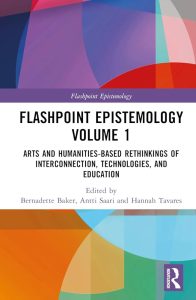By Laurel White
A new book series edited by a School of Education faculty member aims to shed light on the ways complicated new conflicts about technology are shaping education in the 21st century.
The first two volumes in the “Flashpoint Epistemology: Education in the Age of Interconnection and Complexity” series were released in December by Routledge. Bernadette Baker, professor in the School of Education’s Department of Curriculum and Instruction, is the lead editor of the series, which brings together a diverse array of authors’ perspectives on flashpoints in contemporary education.

Baker defines those flashpoints as moments when different value systems embedded in different discourses come together, forcing urgent responses.
“In education, you can’t just hang out in limbo land,” Baker said. “You’re tied to a profession that’s shaping people’s children. Flashpoints force dedicated responses and differential impacts follow from those responses.”
Baker works in the fields of curriculum studies, philosophy of education, and global studies. Through her research, she explores how realities and knowledge are created.
“These volumes elaborate on the challenges to what the production of knowledge now means,” Baker said. “There’s a whole series of ways in which what counts as knowledge is being redefined, and there is not always equal access to those conversations or redefinitions. Some forms of knowledge production are being rapidly outmoded as new forms of expression and creativity open up.”
Baker says the reach of artificial intelligence tools, neuroscience, and big data into classrooms has created urgent questions about the nature of being and knowing. Those questions include how relationships are formed with human and more-than-human actors, rethinking the purposes of education amid those new relations, what evaluation is now evaluating, the role of emotions in new technology development, and the implicit ties between the “eco” and the “techno” that exceed formal classroom life.

“The series examines how lines and levels around older structures are shifting, how ways of knowing are expanding, contracting, and transforming, and how teachers are facing flashpoints in classrooms and researchers in their methods,” she said. “These volumes are providing the space to dig deep into technology not just as toys or aids, but also as levers of change in consciousness.”
Baker notes the two volumes address a broad range of fields. She says they will be meaningful to scholars and educational practitioners across science and technology studies, curriculum studies, global studies, and race studies, among many others. She argues that diversity in subject matter, along with a diverse slate of authors from a wide swath of academic and professional backgrounds and experience levels, is essential to addressing flashpoints. She and her co-editors deliberately composed the volumes to bring early career and senior educators together, as well as authors from across the country and the globe.
The series is expected to include at least two more volumes over the next two years. Baker says it will retain this commitment to creating a space for dialogue between many stakeholders.
“The series will offer analyses from different stakeholders and geopolitical sites, illuminating how new technologies are being navigated, negotiated, embraced, or resisted amid dedicated responses,” she said. “Our hope is that it contributes to a much-needed ongoing dialogue that is inclusive and widespread, conversations that can hold in the one embrace bigger pictures regarding changing social compacts and distributive logics and smaller pictures of context-specific innovations that can be wondrous and enormously helpful.”
Baker edits the series with Department of Curriculum and Instruction doctoral program alumna Liang Wang, as well as Antti Saari, an associate professor at Tampere University in Finland, and Hannah Tavares, an associate professor at the University of Hawaii at Manoa.
More information about “Flashpoint Epistemology: Education in the Age of Interconnection and Complexity” is available here.